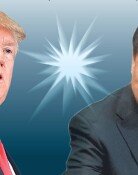Koreas Nuclear Issue to the UN Security Council Depends on the Iranian Situation
Koreas Nuclear Issue to the UN Security Council Depends on the Iranian Situation
Posted November. 23, 2004 23:40,
It appears that if Koreas nuclear material experiment issue is submitted to the U.N. Security Council at the IAEA conference on November 25 in Vienna, Austria, it will beclosely related to the Iran nuclear issue.
This is because the positions of the E.U. nations and the U.S., which wants to bring the Korea and the Iran nuclear issue, respectively, to the Security Council, are entangled.
If the Iranian nuclear issue is not submitted to the Security Council, the chance that Koreas issue, which is a lesser violation, will be brought to the Council will decrease.
With Koreas delegation headed by Foreign Ministrys Deputy Minister Choi Young-jin having arrived in Vienna on November 22 to attend the board of the IAEA, the reason an authority elucidated that it seems, virtually, that Koreas nuclear experiment issue will not be referred to the Council was in the aforementioned context.
Three E.U. nations, including Britain, Germany, and France, are accelerating negotiations with Iran, stating that the Iranian nuclear issue should be settled before it is referred to the Security Council.
On November 22, these three nations drafted the resolution requesting the secretary general of the IAEA to report immediately to the board if Iran resumes the enrichment process. It is interpreted that they will extract the promise from Iran that it will not resume the enrichment process so that they can block the reference to the Security Council and the U.S. sanction measures beforehand.
Thus, foreign press convey that there are indications within the E.U. that the argument of the three countries to submit Koreas nuclear experiment to the Security Council lacks logical persuasiveness.
However, if the U.S., which is aggressive on the Iranian nuclear issue, pushes to submit it to the Council, Korea cannot relax. It is because the U.S. can submit the Iran issue to the Security Council using Koreas case of slight violation as a stepping stone. It is known that some hard-liners within the U.S. are making such an argument.
On his visit to Colombia, President George W. Bush stressed on November 22 concerning the Iran nuclear issue, Externally, it appears that there is some progress, but verification is a must.
The resolution draft made by the three E.U. nations did not comment on sanction measures in case Iran resumes the enrichment process. This is where the U.S. can repel sufficiently.
Iran submitted a paper of agreement to stop the uranium enrichment process to the IAEA on November 14, but the U.S. still cannot trust Irans true intention.
Hye-Yoon Park parkhyey@donga.com







